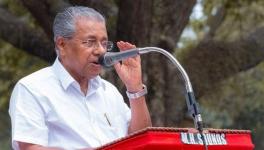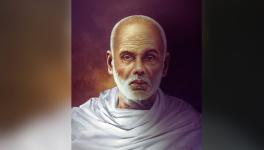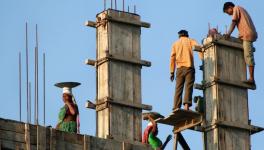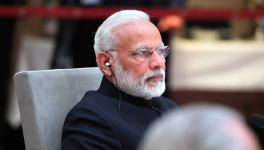Remembering Puthukudi Pushpan: Death Was Closer to Him Than Life, Yet he Faced it With a Smile
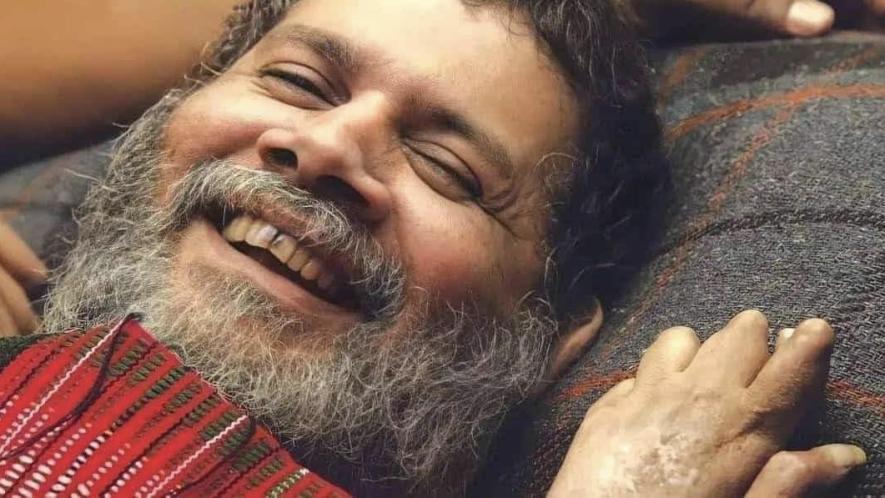
Puthukudi Pushpan.
On September 28, the living martyr of the Koothuparamba struggle, Puthukudi Pushpan, concluded his epic battle with death at the age of fifty-four. He has now joined the ranks of countless martyrs who have inspired generations.
Convincing future generations of Pushpan’s remarkable journey may not be easy. At just twenty-four, he was shot by police during a protest, leaving him paralyzed for the rest of his life. Bedridden for nearly three decades, he endured the long years with only his tongue and eyelids able to move. Despite living in the shadow of death, he fought to survive for twenty-nine years, ten months, and three days, embodying extraordinary revolutionary willpower.
A lifetime of struggle
Born in 1970 in a remote village in Kerala, Pushpan grew up as the son of agricultural workers. Due to financial hardships, he had to leave school early and enter the workforce. An active member of the children’s organization Balasangham and later the student organization SFI (Student Federation of India), he remained involved with the DYFI (Democratic Youth Federation of India) and the Communist Party of India (Marxist) whenever he returned home. This commitment ultimately led him to the Koothuparamba struggle.
On November 25, 1994, Koothuparamba, a town in Kerala, became the backdrop for one of the most intense protests against globalization policies. Spearheaded by the youth movement DYFI, the struggle aimed to oppose the privatization and commercialization of the education sector and the corrupt practices of the then right-wing government of Kerala. Thousands gathered to wave black flags at a minister from the right-wing government. Without warning, police opened fire, killing five young activists—KK Rajeevan, Madhu, Shibulal, Babu, and KV Roshan—and injuring many others. These five young comrades became the first martyrs in the fight against neoliberal policies in India. Pushpan was shot in the neck, sustaining severe spinal injuries that left him bedridden. Many believed he wouldn’t survive beyond a few days, but this marked the beginning of his extraordinary fight against death. A year later, he returned home from the hospital, never to stand again, confined to a life that rarely extended beyond home and the hospital.
Defying death, cultivating life
As a member of the Communist Party of India (Marxist), Pushpan became a symbol of resilience. Over the decades, countless visitors came to see him—ranging from high-ranking leaders of CPI (M) and freedom fighters to ordinary people drawn by his indomitable spirit. His home became a gathering place, where visitors could connect with the revolutionary who had seemingly defied death itself. In his later years, there was never a day without guests, as he remained ever-present among the people, embodying the hopes of those dreaming of a better world.
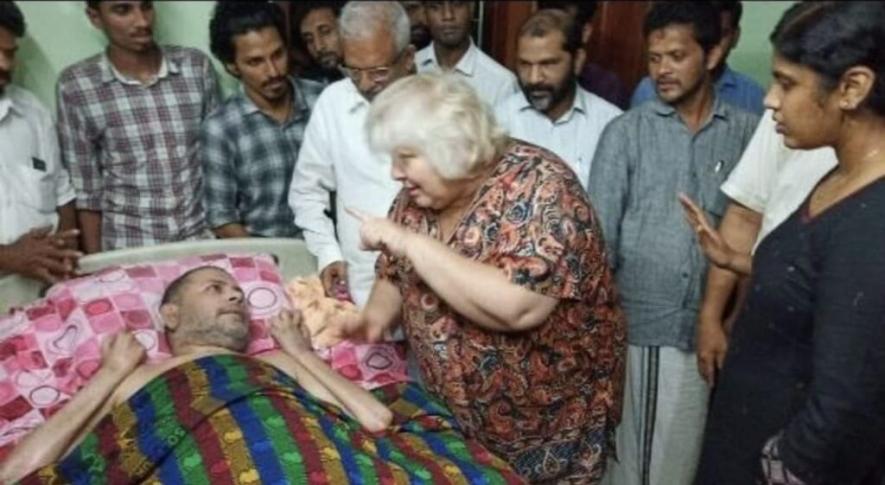
Puthukudi Pushpan with Aleida Guevara.
Pushpan welcomed everyone with warmth. Despite his body shrinking from lack of mobility, he exuded a spirit that captivated all who met him. Those unsure of what to say found themselves engaged in conversation as he spoke with an unyielding optimism. Despite enduring excruciating pain, he did not lament his fate or harbor bitterness; instead, he echoed the words of Czech communist, executed by Nazi Germany, Julius Fucik, who, from his gallows, proclaimed, “We loved life. For its beauty, we went to fight.”
I had the privilege of meeting Comrade Pushpan several times over the past fifteen years. Each encounter infused me with strength and confidence. He was neither a man of grand rhetoric nor of self-aggrandizing claims. He never initiated conversations about his own life, focusing instead on the world around him. I recall visiting him in 2012, just after I joined JNU, when our conversation revolved entirely around developments on campus—his questions revealing a keen awareness of the ongoing political discourse.
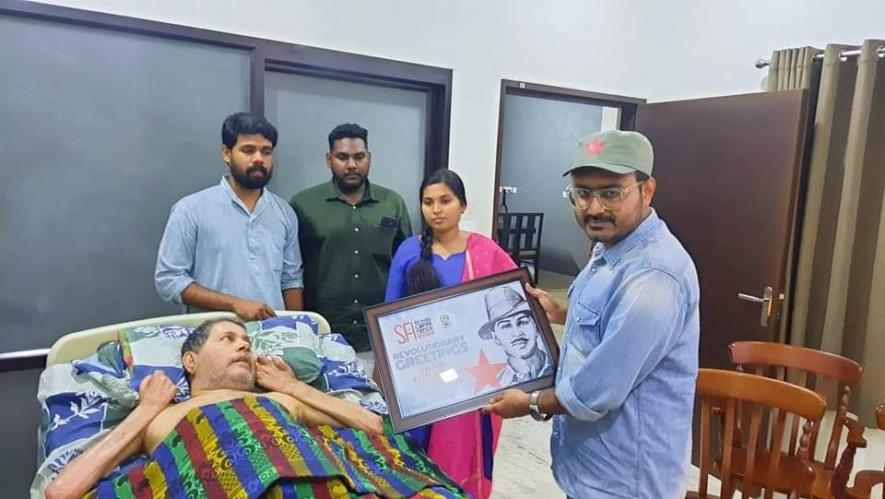
Leadership of SFI visiting Puthukudi Pushpan.
“I can’t forget that infectious smile,” recalled Preethy Sekhar, a former DYFI leader. “I have met him just twice. Both time in DYFI program in Koothuparambu. I was surprised to experience the positivity of Comrade Pushpan. Kannur comrades later told me that he never complained of anything and never was depressed with life. What a man he was! What inspired him so much is still unknown to me!”
As news of his passing spread, tens of thousands gathered to pay their final respects—a diverse assembly of people from all generations. Like Pushpan’s life, his last journey became a historical rarity. The sea of mourners who came to bid him farewell was a testament to the enduring inspiration he provided, even as his body succumbed to exhaustion.
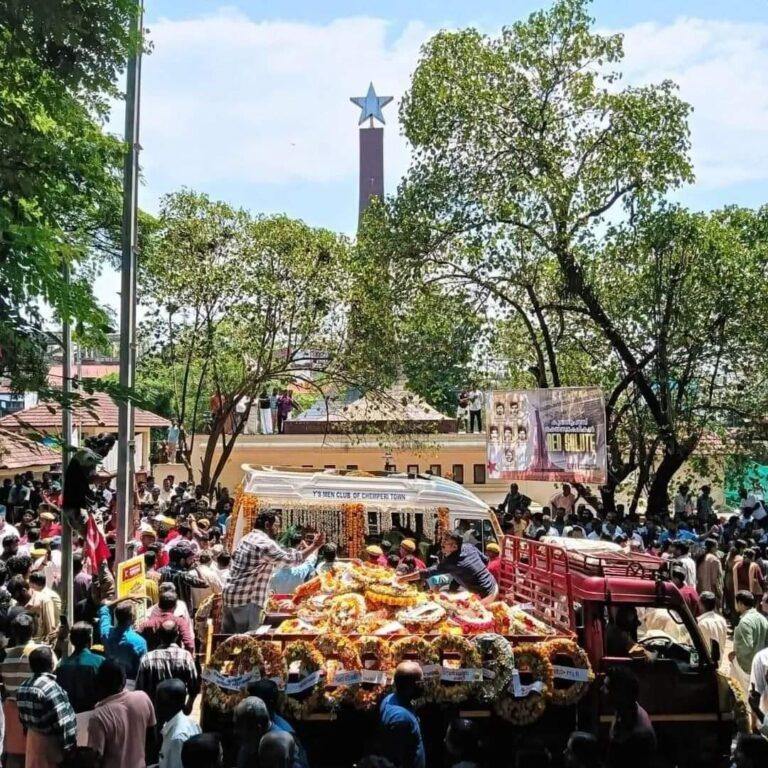
Funeral procession for Puthukudi Pushpan.
Comrade Pushpan emerged as a martyr who delayed his own death for the sake of all the martyrs in world history. His eyelids remained dry from personal loss, and his tongue never spoke a word to empower the oppressors. He lived for nearly three decades on the strength of an indomitable political will.
Pushpan was hailed as a living monument to the struggle in Koothuparamba. With his passing, the curtain falls on the epic life of a martyr. How do we honor someone who has already transcended death long before their final breath?
Nitheesh Narayanan is an activist with the Students’ Federation of India (SFI) working as a member of its central secretariat. He got his PhD from the Centre for the Study of Social Exclusion and Inclusive Policy of Jawaharlal Nehru University in New Delhi.
Get the latest reports & analysis with people's perspective on Protests, movements & deep analytical videos, discussions of the current affairs in your Telegram app. Subscribe to NewsClick's Telegram channel & get Real-Time updates on stories, as they get published on our website.









